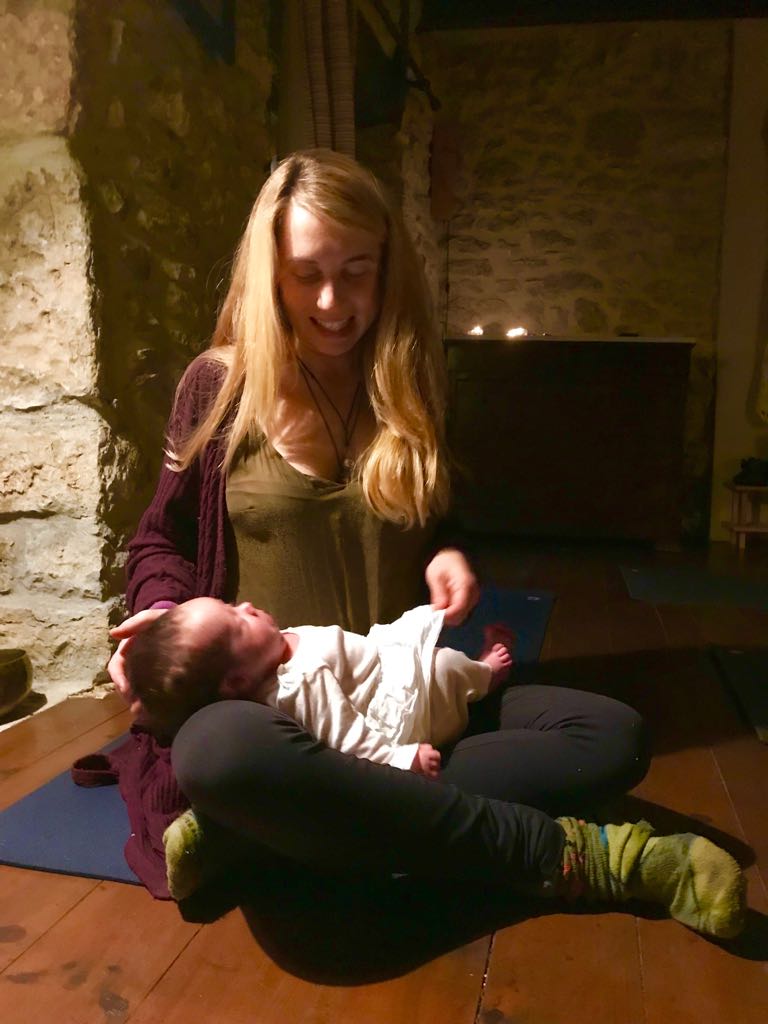Our daughter arrived in October of 2017, exactly three months ago today. Anyone who has gone through the process of being pregnant knows that actually, ” mothering” in some form anyway, begins the instant one recognizes that she is pregnant. At this point, a shift in consciousness takes place, a shift that instantly places the needs of the life growing within above the needs/desires of ones self.
Before becming pregnant, it was simple enough to define a goal and carry it through to completion. Goals are not inherently good or bad; what can be an unproductive or an “un-yogic” habit that arrises in the pursuit of a goal, however, is the attempt to control the result of one´s actions and developing attachment to the outcome . The Bhagavad Gita, one of Indias most ancient and authoritative texts on yoga at the psychological level, opines that one must perform his or her life´s “right” works/actions free from any attempt to control, and without any attachment to the outcome.
“The race of men is bound because of action performed from motives of reward and gain; it hath become attached to its desired objects and must toil on until freedom comes at last. But do thou avoid, this folly…and do thou perform thy dutiful and proper tasks unattached and free” (Bhagavad Gita).
The keys are:
1. Be clear regarding one´s “right action”
2. Possess the capacity and conviction to carry out the action
3. Maintain the mental grace to release attachment to the result, accepting that the work/action was performed to the best of your ability given the circumstance available.
“Therefore, such action, springing from Duty, free from attachment or dependence, leadeth one straight to the consciousness and plane of Spirit” (Bhagavad Gitta).
The tendency to try to control can go unnoticed for a long period of time, so long as there is nothing to interfere with one´s trajectory of personal will. A child, especially a fully dependent infant, may be the most obvious source of beautiful interference in personal will. The child´s rhythms have nothing to do with those you have set for yourself. Babies will express their needs when they arrise, irrespective of social cues or parents´ plans. They are the perfect impetus to move one into a state of surrender. Their physical and emotional needs are some of the clearest cues that inform us in what ways we must ACT!
Life may become abhyasa- constant practice of yoga- when one is acting without attachment to the fruits of his or her life´s work. When one acts with the motivation that the action will carry with it a particular result, then these actions are not yogic. I practice Ashtanga vinyasa because I recognize that the daily practice of uniting mind, body and breath supports my health and mental clarity. However, building resentment due to limitation in certain postures in the series, or from shortening/foregoing a day of this practice due an unpredictable but earnest cause (a child needing attention, for example) completely contradicts the essence of WHY we practice in the first place. In this example, the feeling of resentment would signal having become attached to the act of practicing Ashtanga. Tension and mental instability is generated because of fixation on a goal (even one so noble as an ashtanga or meditation practice) rather than released by surrendering to the reality of the needs of the present moment, which may unfold in a variety of unsuspecting ways.
W hat is my “Right Action,” as described in the Bhagavad Gita? How do I maintain the strength and conviction to act as is needed? As dynamic beings, and especially as parents, we can experience a sense of equilibrium by moving and thinking fluidly. The work that demands our time and inspires our spirt becomes a moment to moment unfolding rather than a fixed routine. By engaging in this way, engaging in the present moment, energy and time abounds for all of life´s works.
Great creative potentials and mental disciplines have the most room to flourish and be of beneficial consequence when they are pursued because of that undefinable yet undeniable inner force which impels them forward, and with freedom from feeling attachment to the outcome.




